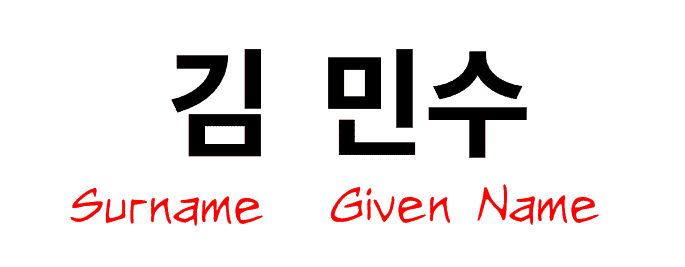Many foreigners have developed an interest in Korean culture due to K – dramas, Kpop music, and Korean. But, are you excited to know what could be your Korean name, aside from knowing the names of your favorite artists?
If you look up other common family names, you’ll find that although their words sound similar, their origins are likely to differ. Given the vast population in Korea, few formally approved Korean surnames, though this is increasingly shifting due to globalization.
As such, this blog entails how I figured out and know my Korean name. Read on as this will also give you a guide on learning every detail of your name and writing scheme.
The Basics of Korean Names
You may think that Koreans have similar surnames as what you’ve always heard and seen from movies and even the surname of the actors. But, there are the most common Korean surnames on top of it.
A surname and a first name are the two components of a Korean name. Here are the differences of both surnames and given names in the Korean name scheme to run through.
Korean Surnames
A person inherits their father’s surname in most other cultures, but a female does not inherit their husband’s surname after they marry. They are commonly made up of hanja, which are Chinese characters pronounced in Korean.
Additional facts: Hanja are no longer fully used within North Korea, but their use in given names in South Korea is limited to 5,038 characters. However, Kim, Lee, Park, Jeong, and Choi, on the other hand, are the most common Korean surnames.
Korean Given Names
Given names are usually decided in particular by generation names, a Chinese custom. Most Koreans have given names that combine a generational name with a uniquely distinct syllable, although it is becoming less common among younger generations.
On the one hand, in the Western context, where there is a strong distinction between the middle, last name, and first name, middle names are not known in Korea.
On the other hand, nicknames have a long and illustrious history, which continues today. Kids are provided nicknames, such as amyeong, and married women are referred to as taekho after their hometown.
4 Tips for Writing Your Name in Korean
When people are trying to find out how to write their names in Korean, one common problem they make is writing their English names the way they are pronounced. Here are a few tips that you’ll need to apply to your learning process.
- Consider one consonant and one vowel of each syllable
A consonant and a vowel sound are needed in Korean words. So, in the example of one consonant name – either male or female name, add the Korean vowel (eu) in this situation. And to remember that this number one rule applies to a Korean name with a syllable beginning with the letter “t.”
- Letter’ F’, ‘V’ & ‘Z’ rules
Not all letters in foreign are present in the Korean alphabet and words. Since the letter ‘f’ does not exist in Korean, you will write a name beginning with ‘f’ and ‘p’ with the consonant’ ㅍ.’
Also, the letter ‘v’ is pronounced as ‘b,’ and all syllables that start with these letters must be written in consonant ‘ㅂ.’ Lastly, the letter ‘z’ also is pronounced as ‘J (ㅈ)’ in Korean names.
- ‘H’ and ‘R’ at the end of the syllable should be silent
You should note that the ‘r’ sound at the end of each name is omitted in the Korean translation. In the letter ‘h” case, if your name ends with it, it should automatically be silent. This is due to the National Institute of Korean Language rules requiring borrowed words and a name to be written in a specific way to prevent misunderstanding.
- Few distinctions at the end of the syllables
Aside from making letters silent and adding some vowels in a Korean word, there’s also a rule for applying, either way, other writing schemes for selected phrases. In an instance, words that end in the letter ‘sh’ are also difficult to write in Korean, so that you can use either ‘시 (si)’ or ‘쉬 (swi).’
You can use the batchim ‘ㅂ’ or ‘프’ if your name ends in a ‘p’ or ‘ph,’ depending on your choice. And a character would have a syllable ending in ‘t’ can be written as either‘ㅅ’ or ‘트.’
Why is learning Korean names important?
Every Korean name has different meanings and symbols. For example, more parents nowadays would like to seek assistance from naming gurus to ask a name that could bring luck and happiness to their lives. But it’s not that necessary, though.
As you can see, the easiest way is to look up how your name is officially written in Korean, or you can even use a Korean name generator and look at how exciting it is to discover your Korean name.
Of course, you may also make up a Korean name or look for a Korean name that sounds similar to yours. It’s exciting and fun to introduce oneself to others using this language aside from English.









